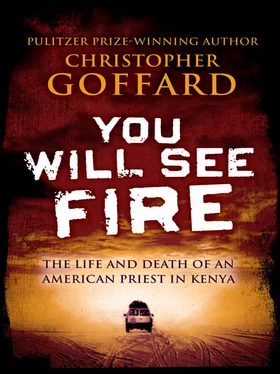GATHENJI ENTERED PRIVATE practice in 1980. On his wall hung a photograph of Moi standing with Kenyatta. He represented clients who had been swept up in government raids in the northeast province bordering Somalia, which was under emergency rule amid threats of succession and widespread violence from militias and bandits, called shifta. Suspects were hauled in on gun-running charges on flimsy evidence. Residents were required to be in their homes between the curfew hours of 6:00 P.M. and 6:00 A.M.; someone caught outdoors fifteen minutes later would be charged. Gathenji argued for a broad interpretation of the definition of home: If you lived in a hut or a tent and stepped into the bush to relieve yourself, you were still on home ground. Few lawyers took these cases. He risked the perception that he was collaborating with the government’s enemies.
The unhappiness with Moi already ran deep, and talk of coups was everywhere. Gathenji was not entirely surprised when, one morning in August 1982, he turned on the radio and heard that the government had been overthrown. He was living with his wife and two young sons in a Nairobi suburb. Disgruntled junior officers of the Kenya Air Force—mostly Luos—had seized the airports, the post office, and the Voice of Kenya radio station. The country’s new masters announced that existing codes of law had been suspended, effective immediately. Gathenji said to his wife, “Did you hear what happened? I no longer have a job.” It was impossible to gauge the seriousness of the danger. The continent had become an ever-changing map of violent and quickly deposed strongmen.
In the pandemonium, rioters looted Nairobi, inflicting a disproportionate toll on businesses and homes owned by Asians, who occupied the merchant class and were widely resented as outsiders. Scores, perhaps hundreds, of Asian girls were raped. Moi’s loyalists swarmed the city, fanned across the rooftops, and gunned down suspected insurgents and looters. The coup was crushed, and Moi was restored to power almost immediately.
Gathenji drove into town days later to inspect his office. He’d heard a rumor that the capital was safe, but it took only a cursory glance to sense it had been a false one. Bodies were still slumped inside bullet-riddled cars along the road. Televisions were lined up on the sidewalks, and broken glass glinted on the pavement. Every rooftop seemed to bristle with rifles. Soldiers were jittery. They ordered Gathenji to step out of his car and place his hands above his head and his ID card in his mouth. One soldier insisted that Gathenji had stolen his car, and he demanded that he prove otherwise by furnishing registration papers. Gathenji didn’t have the papers on him. For a moment, he thought, This is where I am shot. On Uhuru Highway, heading back home, he drove frighteningly close to a camouflaged tank, planted in the road, before he realized what it was. He turned the wheel hard and found another way home.
Soon after the abortive takeover, when the courthouses reopened, Gathenji arrived in court and found the dock crowded with defendants, some of them wildlife rangers and civil service workers, who had been charged with celebrating the coup. He watched a few plead guilty and receive jail sentences; in an atmosphere still so highly charged, no judge would leave them unpunished. Gathenji gave the others some advice: Enter not-guilty pleas and wait until the temperature abates. It proved a solid hunch: The cases were soon dismissed. The president wanted to discourage the impression, it appeared, that any of his subjects had reason to celebrate his ouster.
Meanwhile, in Kisiiland, an obscure middle-aged missionary named John Kaiser was trying to assess the country’s trajectory. “ The coup attempt was a terrible shock Конец ознакомительного фрагмента. Текст предоставлен ООО «ЛитРес». Прочитайте эту книгу целиком, купив полную легальную версию на ЛитРес. Безопасно оплатить книгу можно банковской картой Visa, MasterCard, Maestro, со счета мобильного телефона, с платежного терминала, в салоне МТС или Связной, через PayPal, WebMoney, Яндекс.Деньги, QIWI Кошелек, бонусными картами или другим удобным Вам способом.
to our Asian community & many of them are leaving the country,” Kaiser wrote in a letter to Minnesota. “The result will be great harm to the economy of Kenya but you sure couldn’t tell the average African that. On the day of the coup attempt I knew all policemen, G. wardens, etc would be in their barracks and huddled around radios so I took the opportunity to picky picky into Masailand a few miles and harvest a nice fat young w. hog.” His humor veered into a rare, dark register. “We had to do without such delicacies for many months due to the pressure of the special anti-poaching unit in the Kilgoris area, so we were grateful to the coup leaders & look forward to many more.” By the end of the month, Kaiser was sensing the atmosphere had changed permanently. “Things are quiet,” Конец ознакомительного фрагмента. Текст предоставлен ООО «ЛитРес». Прочитайте эту книгу целиком, купив полную легальную версию на ЛитРес. Безопасно оплатить книгу можно банковской картой Visa, MasterCard, Maestro, со счета мобильного телефона, с платежного терминала, в салоне МТС или Связной, через PayPal, WebMoney, Яндекс.Деньги, QIWI Кошелек, бонусными картами или другим удобным Вам способом.
he wrote, but added, “I’m afraid the country won’t have the same easy peaceful aspect from now on.”
IT WAS A prescient assessment. The violence, and the fears it unleashed, proved useful to Moi Конец ознакомительного фрагмента. Текст предоставлен ООО «ЛитРес». Прочитайте эту книгу целиком, купив полную легальную версию на ЛитРес. Безопасно оплатить книгу можно банковской картой Visa, MasterCard, Maestro, со счета мобильного телефона, с платежного терминала, в салоне МТС или Связной, через PayPal, WebMoney, Яндекс.Деньги, QIWI Кошелек, бонусными картами или другим удобным Вам способом.
, who justified his tightening grip as a safeguard against further anarchy. Paranoia became entrenched as national policy. Because it was dependent on Western aid and tourism, Kenya required the barest simulacrum of democracy and the rule of law. This did not prevent him from outlawing opposition parties and expanding the secret police. He eviscerated judicial independence at a stroke, pushing through the parliament a law giving him the power to sack any judge at his whim. The entire justice system fell into his grip; no one would be prosecuted, or spared prosecution, if he decreed otherwise. The courts, stacked thick with his stooges, were spiraling into a morass of corruption so universal that there was little effort to hide it. Three out of four judges, by Gathenji’s estimate, expected bribes; clients expected to buy their way out of trouble. More than once, he found himself preparing a case meticulously, building it airtight, only to lose on the flimsiest pretext. Everyone knew: Somewhere, money had changed hands.
Читать дальше












